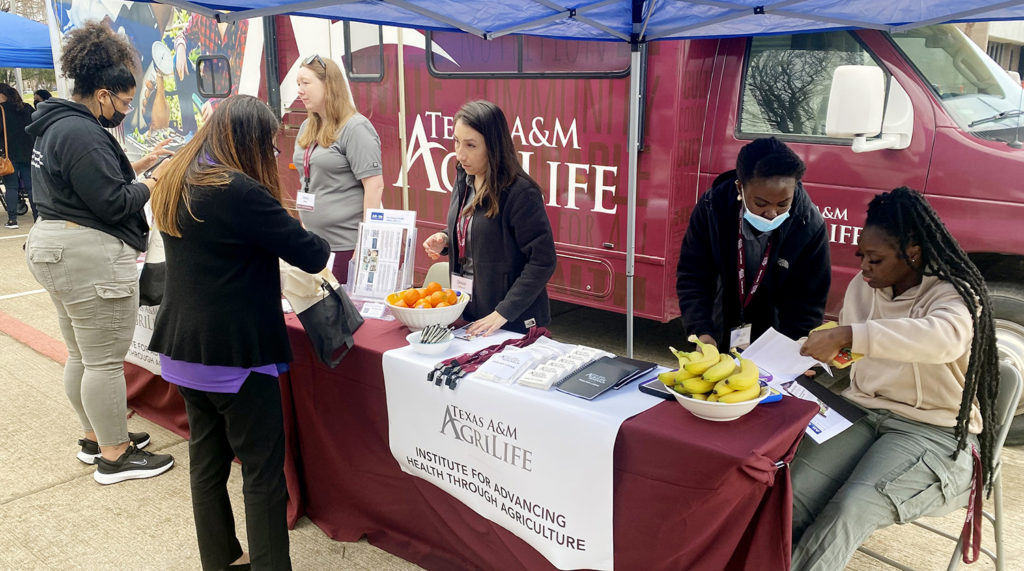Community-engaged healthy living research on the road
Texas A&M AgriLife Institute for Advancing Health Through Agriculture launches community health research efforts in West Dallas
On March 5, public health scientists within the newly established Texas A&M AgriLife Institute for Advancing Health Through Agriculture, IHA, launched a statewide, community-engaged research initiative at the City of Dallas’ “I Heart Health” event.

IHA activities at this event were the first in a series of studies to understand how social interactions and community environments affect health behaviors.
“The IHA’s Healthy Living research efforts are focused on the social and behavioral sciences,” said Rebecca Seguin-Fowler, Ph.D., registered dietitian and associate director of healthy living at the IHA. “Specifically, we conduct community-engaged research, which means we’re involving community members at critical, key phases in the research process as opposed to entering the community and running studies independently.
“The West Dallas I Heart Health event provided our team a perfect venue for helping community members understand the research and their potential role in it.”
Healthy living team to create sustainable, scalable strategies to improve health outcomes
Healthy living is one of three broad research areas within the IHA, alongside precision nutrition and responsive agriculture—collectively aiming to use a systems approach toward reducing diet-related chronic disease.
The IHA’s healthy living research team is working to understand the behavioral and social aspects of health and nutrition in order to reduce diet-related chronic disease and make health achievable to all. The researchers do this by working alongside specific communities and involving community members directly in critical steps of the research process, so the community members are informing solutions that address their own needs.
“The idea is that any future solutions resulting from our research would be informed by communities and shared back with communities,” Seguin-Fowler said.
The team’s research is critical, given that roughly half of all adults in the U.S. are affected by diet-related chronic disease. The nation’s economy annually spends well over $1 trillion on health care or related costs.
“The epidemic of diet-related chronic disease in our country cannot be remedied by one solution,” said IHA Director Patrick Stover, Ph.D. “Through the bold, interdisciplinary vision of IHA, we are bringing together research, with a focus on social and behavior sciences, in responsive agriculture, precision nutrition and healthy living to accelerate solutions that consider the entire ag-food value chain—from the farm to the consumer to communities — that can help people be healthier.”
“Our community-centric approach is key to the overall success of the IHA,” Seguin-Fowler said. “Food and health are intrinsically linked, but food is also rooted in our cultures and accessibility plays a role in what food people eat too. Through our healthy living research, we will advance fundamental knowledge about behavioral choice in sociocultural and environmental context, developing more adaptable solutions that fit different individuals, communities, settings and systems.”
Taking healthy living research to the Dallas community
In the team’s first community engagement at “I Heart Health” in West Dallas, IHA healthy living researchers reached members of the community with information on upcoming studies in which residents can engage.
“We are talking to West Dallas community members about two different prescription-based produce box studies that we are getting started,” said Alexandra MacMillan Uribe, Ph.D., registered dietitian, the IHA researcher who is spearheading these studies. “One of our studies is focused on health outcomes for parents and caregivers to toddlers if they receive free weekly produce boxes. The other is similarly designed but focuses on community members who are at risk for diet-related chronic diseases.”
The studies seek to understand how effective a free weekly produce box may be at increasing fruit and vegetable consumption in at-risk populations. The study design engages health care providers in the community as well. If the initial studies are successful, MacMillan Uribe said they could lead to larger-scale studies to determine if interventions like this could help at-risk individuals increase fruit and vegetable consumption.
IHA healthy living researchers at “I Heart Health” also engaged attendees with information about forthcoming IHA projects, collecting contact information from those interested in participating. They also shared information about the National Institutes of Health All of Us study — a 1-million-person study to understand how biology, environment and lifestyle affect health.
Paving the future for a healthier Texas
In the coming months, the IHA will continue to expand its healthy living research across Texas. The IHA has Healthy Living Mobile Units that are large, graphics-wrapped vehicles that will serve as physical coordination points for engaging community members in various projects to better understand the social, environmental and behavioral aspects of nutrition and health.
The mobile units will include equipment that will enable the team to measure a range of health-related behaviors such as diet and exercise as well as biological markers such as blood sugar, cholesterol and blood pressure, body weight and others.
“With our focus on community-engaged research, these mobile units aim to inspire collaboration, innovation and community transformation toward healthy living,” Seguin-Fowler said.


